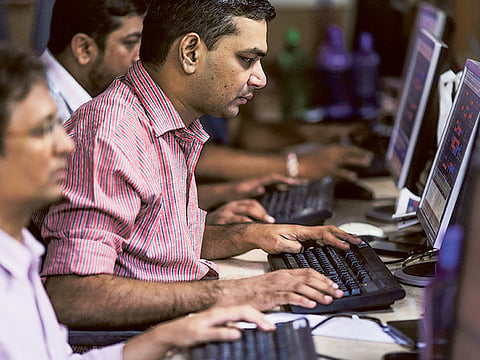Indian stocks: an outlier in Emerging markets complex
Indian equities is top pick for EIB among the otherwise gloomy emerging markets

Dubai: After the retracement from the initial euphoria, valuations of Indian equities are the most attractive and Nadi Bargouti, a top official at Emirates Investment Bank, feels that world’s fastest growing economy is an outlier in the emerging market complex.
The benchmark Bombay Stock Exchange index has shed only 7 per cent so far in the year, a gauge for an economy that is considered as the only bright spot in the otherwise gloomy world.
“Emerging markets have been impacted the most due to the talks about a rate hike, and so also their currencies. China has been scaring investors off the emerging market complex. Despite a gloomy outlook for emerging market complex, India is our top pick with all the changes with the new government,” Bargouti, who is the managing director and head of asset management, told Gulf News in an exclusive interview.
“If we look at Brics [Brazil, Russia, India, China and South Africa] countries for example, India actually stands out. If we looking emerging markets, India would be our best bet because of its attractive valuations and structural changes in the economy,” Bargouti added.
The EIB is currently underweight on Indian equities and by mid next year it plans to re-rate them to overweight, and by the end of 2016 it plans to be significantly overweight.
Barings Asset Management also agrees with Emirates Investment Bank. “On counts of GDP growth and the fiscal deficit or current account deficit, India is relatively well-placed and so should have less of an impact of the expected hike in fed funds rate,” Ajay Argal, Head of Indian Equities, Baring Asset Management told Gulf News over email.
Barings is positive on private sector financials, consumer discretionary and industrial stocks.
Jump in
“The sentiment that we saw immediately after the government came to power has died down and this is what we believe an opportunity for us to jump in. There has been a lot of changes happening in India, but it will take time given the nature and size of the economy. So we believe it is a fantastic entry point for India markets, and we would like to see the benefit from this over the next couple of years,” Bargouti said.
EIB didn’t jump on the bandwagon when everyone was buying because the bank thought it was overhyped, but it now considers as a good entry point in Indian stocks and plan to build up positions over the next couple of years.
India has been tremendously benefited from a more than 50 per cent decline in oil prices and shifted the money in making roads, and has invested in infrastructure projects among others.
“Going ahead, we expect manufacturing to expand and leave more disposable incomes in the hands of consumers,” Bargouti said, adding “the government has been working very hard, and we expect those benefits to come in over the next couple of years.”
Shifting gears since September
Ever since September Emirates Investment Bank has been shifting its investments in low volatility instruments like trade finance investments and alternative investment strategies from highly volatile ones after raising cash from equities and fixed income in September.
“We have been deploying our cash in low volatile instruments that would give you stable returns until market stabilises. We will continue to have exposure to these asset classes, but plan to shift back to equities going into new year,” Bargouti.
EIB plans to avoid Brazil and cautious on Russia given that the market has been oversold. The bank feels that Iran would be one of the most attractive markets after it opens for investors next year.
In Asia
Elsewhere in Asia, Min Lan Tan, head of APAC investment office, UBS, feels ample domestic liquidity and intensified policy support should prevent a hard landing in China, keeping regional sentiment afloat, despite an impending Fed rate hike and US dollar strength.
Asian investors began 2015 with a robust equity market, which kept capital outflows contained. With the Chinese equity bubble burst, Asia’s second largest economy shifted its forex regime.
“We thus view Southeast Asian currencies, such as the Malaysian ringgit and the Indonesian rupiah, with caution. While higher oil prices should boost Malaysia’s prospects, a gradual lift will keep inflation expectations anchored regionally,” Lan said in a report.
“South Asia is particularly exposed to the credit slowdown, but we expect expansive policy to cushion gradual credit cycle deflation. We are also optimistic on the momentum of regional reforms, particularly in Singapore, India and China; valuations in India reflect this, China and Singapore less so,” Lan added.
Sign up for the Daily Briefing
Get the latest news and updates straight to your inbox



